Professor C.V Raman surprised his students by suspending freely a tiny light ball in a transparent vacuum chamber by shining a laser beam on it. Which property of EM waves was he exhibiting? Give one more example of this property.
The property of em waves exerting radiation pressure on the ball is exhibited by him . The ball can be suspended due to radiation pressure exerted by the leser beam . Tail of comet is an example of radiation pressure on the formation of tail .
Topper's Solved these Questions
- BOOK - MODERN PUBLICATIONCHAPTER - ELECTROMAGNETIC WAVESEXERCISE - NCERT FILE ( NCERT EXEMPLAR PROBLEMS SUBJECTIVE QUESTIONS ) ( SHORT ANSWER TYPE QUESTIONS )7videos
ELECTROMAGNETIC WAVES
- BOOK - MODERN PUBLICATIONCHAPTER - ELECTROMAGNETIC WAVESEXERCISE - HIGHER ORDER THINKING SKILS & ADVANCED LEVEL5videos
ELECTROMAGNETIC WAVES
- BOOK - MODERN PUBLICATIONCHAPTER - ELECTROMAGNETIC WAVESEXERCISE - NCERT FILE (NCERT EXEMPLAR PROBLEMS OBJECTIVE QUESTIONS)13videos
ELECTROMAGNETIC WAVES
- BOOK - MODERN PUBLICATIONCHAPTER - ELECTROMAGNETIC INDUCTIONEXERCISE - CHAPTER PRACTICE TEST FOR BOARD EXAMINATION14videos
ELECTROMAGNETIC INDUCTION
- BOOK - MODERN PUBLICATIONCHAPTER - ELECTROSTATIC POTENTIAL AND CAPACITANCE EXERCISE - Chapter Practice Test9videos
ELECTROSTATIC POTENTIAL AND CAPACITANCE
Similar Questions
Professor C.V. Raman surprised his students by suspending freely a tiny light ball in a transparent vaccum chamber by shining a laser beam on it. Which property of e.m. waves was he exhibiting ? Give one more example of this property?
View SolutionIn this question below is given a passage followed by several inferences. you have to examine each inference seperately in the context of the passage and decide upon its degree of truth or falsity. Mark your answr as :
(a) If the inference is definitely true i.e. it direclty follows from the facts given in the passage
(b) if the inference is probably true though out definitely true in the light of the facts given
(c] If you think the data are inadequate from the facts given you can not say whether the inference is likely to be true or false .
(d) If you think the inference is probably false though out definitely false in the light of the facts given
(e) If you think the inference is definitely false i.e. it contradicts the given facts
Laws governing the cooperative society are uniform in all states. These laws give the member of a housing society the right to nomination during his life time. This is quite unlike the rule in other property related cases where nomination comes into force after the demise of the member. The question than arise that can the nominee get full proprietorial rights over a flat merely because he has been nominated by a deceased member of the society. Mnay people are under the wrong impression that once a nomination form has been filled their responsibility is over and that he nomiee would have no problem acquiring the property . and that the legal heirs of the member will pose no problem for the nominee.
Property related laws are more or less same in all the states.View Solution
Knowledge Check
- Question 1 - Select One
II. Read the following text and answer the following questions on the basis of the same:
Galvanometer can sense/measure current. Improved mirror galvanometer was developed by William Thomson, later to become Lord Kelvin, in 1858. Thomson intended the instrument to read weak signal currents on very long submarine telegraph cables.
The fundamental problems of transmitting/receiving a singnal through a lengthy submarine cable was that the electrical current tended to be very low (as littles as 1/100,000th of a stadard light bulb). So, it was very difficult to detect it. To solve the problem it was thought that larger amount of electric current would be sent through the line. But Thomson had a different approach. He thought the best response was to devise a device that could read faint signals. The galvanometer, first invented in 1802, was a mean of detecting electric current. It consisted of a needle that was deflected by the magnetic field created by the electric current. But the galvanometers of the day could't detect the weak signals that came through a long underwater cable. But the improved version of galvanometer was highly sensitive to detect the lowest current. The mirror galvanometer consists of a long fine coil of silk-covered copper wire. In the heart of that coil, within a little air-chamber, a small round mirror is hung by a single fibre of floss silk, with four tiny magnets cemented to its back.
A beam of light is thrown from a lamp upon the mirror, and reflected by it upon a white screen or scale a few feet distant, where it forms a bright spot of light, when there is no current on the instrument, the spot of light remains stationary at the zero position on the screen, but the instant a current traverses the long wire of the coil, the suspended magnets twist themselves horizontally out of their former position, the mirror is inclined with them, and the beam of light is deflected along the screen to one side or the other, according to the nature of the current. If positive electric current gives a deflection to the right of zero, a negative current will give a deflection to the left of zero, and vice versa.
The air in the little chamber surrounding the mirror is compressed, so as to act like a cushion, and deaden the movements of the mirror, the mirror is thus prevented from idly swinging about at each deflections.
Improved mirror galvanometer was developed by
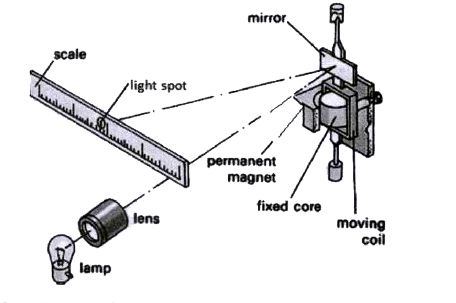 ALord KelvinBJohann SchweiggerCLuigi GalvaniDAndre-Marie Ampere
ALord KelvinBJohann SchweiggerCLuigi GalvaniDAndre-Marie Ampere - Question 2 - Select One
II. Read the following text and answer the following questions on the basis of the same:
Galvanometer can sense/measure current. Improved mirror galvanometer was developed by William Thomson, later to become Lord Kelvin, in 1858. Thomson intended the instrument to read weak signal currents on very long submarine telegraph cables.
The fundamental problems of transmitting/receiving a singnal through a lengthy submarine cable was that the electrical current tended to be very low (as littles as 1/100,000th of a stadard light bulb). So, it was very difficult to detect it. To solve the problem it was thought that larger amount of electric current would be sent through the line. But Thomson had a different approach. He thought the best response was to devise a device that could read faint signals. The galvanometer, first invented in 1802, was a mean of detecting electric current. It consisted of a needle that was deflected by the magnetic field created by the electric current. But the galvanometers of the day could't detect the weak signals that came through a long underwater cable. But the improved version of galvanometer was highly sensitive to detect the lowest current. The mirror galvanometer consists of a long fine coil of silk-covered copper wire. In the heart of that coil, within a little air-chamber, a small round mirror is hung by a single fibre of floss silk, with four tiny magnets cemented to its back.
A beam of light is thrown from a lamp upon the mirror, and reflected by it upon a white screen or scale a few feet distant, where it forms a bright spot of light, when there is no current on the instrument, the spot of light remains stationary at the zero position on the screen, but the instant a current traverses the long wire of the coil, the suspended magnets twist themselves horizontally out of their former position, the mirror is inclined with them, and the beam of light is deflected along the screen to one side or the other, according to the nature of the current. If positive electric current gives a deflection to the right of zero, a negative current will give a deflection to the left of zero, and vice versa.
The air in the little chamber surrounding the mirror is compressed, so as to act like a cushion, and deaden the movements of the mirror, the mirror is thus prevented from idly swinging about at each deflections.
How the idly swinging of the mirror of mirror galvanometer is prevented?
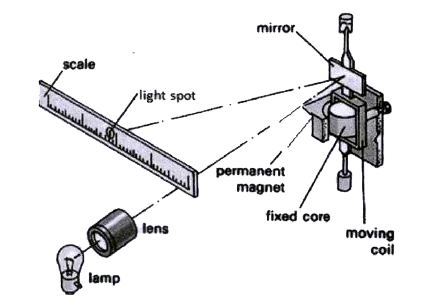 AThe little chamber surrounding the mirror was filled with a viscous liquidBThe mirror was placed in little chamber which was completely vacuumCThe mirror was attached to a springDThe little chamber surrounding the mirror was filled with compressed air
AThe little chamber surrounding the mirror was filled with a viscous liquidBThe mirror was placed in little chamber which was completely vacuumCThe mirror was attached to a springDThe little chamber surrounding the mirror was filled with compressed air - Question 3 - Select One
II. Read the following text and answer the following questions on the basis of the same:
Galvanometer can sense/measure current. Improved mirror galvanometer was developed by William Thomson, later to become Lord Kelvin, in 1858. Thomson intended the instrument to read weak signal currents on very long submarine telegraph cables.
The fundamental problems of transmitting/receiving a singnal through a lengthy submarine cable was that the electrical current tended to be very low (as littles as 1/100,000th of a stadard light bulb). So, it was very difficult to detect it. To solve the problem it was thought that larger amount of electric current would be sent through the line. But Thomson had a different approach. He thought the best response was to devise a device that could read faint signals. The galvanometer, first invented in 1802, was a mean of detecting electric current. It consisted of a needle that was deflected by the magnetic field created by the electric current. But the galvanometers of the day could't detect the weak signals that came through a long underwater cable. But the improved version of galvanometer was highly sensitive to detect the lowest current. The mirror galvanometer consists of a long fine coil of silk-covered copper wire. In the heart of that coil, within a little air-chamber, a small round mirror is hung by a single fibre of floss silk, with four tiny magnets cemented to its back.
A beam of light is thrown from a lamp upon the mirror, and reflected by it upon a white screen or scale a few feet distant, where it forms a bright spot of light, when there is no current on the instrument, the spot of light remains stationary at the zero position on the screen, but the instant a current traverses the long wire of the coil, the suspended magnets twist themselves horizontally out of their former position, the mirror is inclined with them, and the beam of light is deflected along the screen to one side or the other, according to the nature of the current. If positive electric current gives a deflection to the right of zero, a negative current will give a deflection to the left of zero, and vice versa.
The air in the little chamber surrounding the mirror is compressed, so as to act like a cushion, and deaden the movements of the mirror, the mirror is thus prevented from idly swinging about at each deflections.
The mirror galvanometer consists of
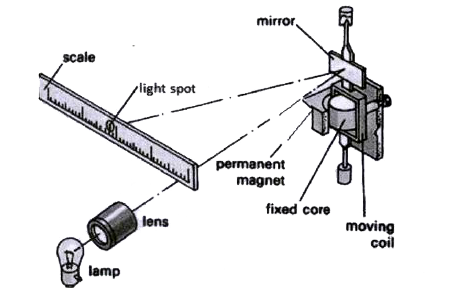 Aa small round mirror attached to a fine coil of silk-covered copper wire.Ba long fine coil of silk-covered copper wire and a small round mirror hung by a single fibre of floss silk, with four thiny magnets cemented to its back.Ca small round mirror attached to four tiny magnets.DNone of the above
Aa small round mirror attached to a fine coil of silk-covered copper wire.Ba long fine coil of silk-covered copper wire and a small round mirror hung by a single fibre of floss silk, with four thiny magnets cemented to its back.Ca small round mirror attached to four tiny magnets.DNone of the above
Dhanamal had become weak and tired. The eighty years old. He made up his mind to over his business to his three sons. One day he called them to him. He wanted to know if they truly loved him. "I love you more than tongue can tell, more than life itself," said the cunning Mohandas. Dhanamal was pleased. His second son Roshan Lal was as false as his brother Mohandas. He said that he loved his father far better than his brother did. It made Dhanamal very happy. The third son Manasukh was his darling. He thought he would say something more. Manasukh too loved his father dearly. But he loved truth even better. He was ashamed of his selfish brothers. They had spoken falsely. They had made a show of love to get their father's business and wealth. Manasukh said, "I love you as a son ought to love his father." He thus spoke the truth. The wise people know that a man is tested by his deeds not by words. But the old Seth was vain and proud. He had become a little foolish. He got angry. He asked Manasukh again. He said he truly loved him but he could not speak as his brothers had done. Dhanamal trembled with rage to hear this. He vowed he would give him nothing at all. He then devided his property between Mohandas and Roshan Lal and handed over to them all authority Honest Manasukh had to leave him. Shortly afterwards the wicked brother began to treat the Seth harshly and cruelly.
Which of his sons did Seth Dhanamal love most?View SolutionPawan is a student of class IX. The students of his class have recently studied the topic on the separation of various types of mixtures. One day, when the students were performing experiements in the science laboratory, their chemistry teacher Mr. Jain came to the laboratory with a packet in this hand. Mr. Jain told Pawan that the packet contained a mixture of aluminium powder, sulphur powder and nuckel powder. He asked Pawan to separate all the three constituents of this mixtures. Mr. Jain allowed the use of any other equipment/device/chemical, etc., required for this purpose from the laboratory. Pawan thought over the methods to be used for separating the given mixture for a while and then started working on the separation of mixture. He succeeded all the constituents of the mixture, one by one. Mr. Jain appreciated his effort.
(a) Which property of sulphur powder could be used by Pawan to separate it from aluminium powder and nickel powder ?
(b) Describe briefly, how Pawan separated sulphur powder from the mixture of aluminium powder, sulphur powder and nickel powder
(c) Which property of nickel powder could be used by Pawan to separate it from aluminium powder ?
(d) Describe briefly, how Pawan separated nickel powder from aluminium powder.
(e) What values are displayed by Pawan in this episode ?View SolutionDinesh is a student of 10th standard. He went to a remote area of Rajasthan for trekking with his friends. Dinesh found that it was a sparsely inhabited area. He was surprised to know that there was still no electricity in this area. The children also had to study with kerosene lamps at night. The village farmers used diesel to run irrigation pumps. Actually, there were no power transmission lines which could bring electricity to this remote area. Dinesh was really disturbed by the living conditions of the people in this part of Rajasthan. One day Dinesh gathered all the people of village in the village school. He told them that if they put pressure on their area MLAs and MP for making available the required funds, then he could tell them about the devices to light up their homes and streets at night, play radio and television and also run irrigation pumps with electricity without there being power transmission lines. All the people agreed and Dinesh described them the devices to get electricity in their area in detail. The village people were very happy to know this and soon they got electricity in their area.
(a) What was the device described by Dinesh to the village people to obtain electricity locally ?
(b) What source of energy is made use of in this device to obtain electricity ?
(c) Why do you think this device is more appropriate for an area like Rajasthan ?
(d) What is the name of the single unit of this device ?
What values are shown by Dinesh in this incident ?View SolutionII. Read the following text and answer the following questions on the basis of the same:
Galvanometer can sense/measure current. Improved mirror galvanometer was developed by William Thomson, later to become Lord Kelvin, in 1858. Thomson intended the instrument to read weak signal currents on very long submarine telegraph cables.
The fundamental problems of transmitting/receiving a singnal through a lengthy submarine cable was that the electrical current tended to be very low (as littles as 1/100,000th of a stadard light bulb). So, it was very difficult to detect it. To solve the problem it was thought that larger amount of electric current would be sent through the line. But Thomson had a different approach. He thought the best response was to devise a device that could read faint signals. The galvanometer, first invented in 1802, was a mean of detecting electric current. It consisted of a needle that was deflected by the magnetic field created by the electric current. But the galvanometers of the day could't detect the weak signals that came through a long underwater cable. But the improved version of galvanometer was highly sensitive to detect the lowest current. The mirror galvanometer consists of a long fine coil of silk-covered copper wire. In the heart of that coil, within a little air-chamber, a small round mirror is hung by a single fibre of floss silk, with four tiny magnets cemented to its back.
A beam of light is thrown from a lamp upon the mirror, and reflected by it upon a white screen or scale a few feet distant, where it forms a bright spot of light, when there is no current on the instrument, the spot of light remains stationary at the zero position on the screen, but the instant a current traverses the long wire of the coil, the suspended magnets twist themselves horizontally out of their former position, the mirror is inclined with them, and the beam of light is deflected along the screen to one side or the other, according to the nature of the current. If positive electric current gives a deflection to the right of zero, a negative current will give a deflection to the left of zero, and vice versa.
The air in the little chamber surrounding the mirror is compressed, so as to act like a cushion, and deaden the movements of the mirror, the mirror is thus prevented from idly swinging about at each deflections.
Mirror galvanometer galvabometer was primarily used to
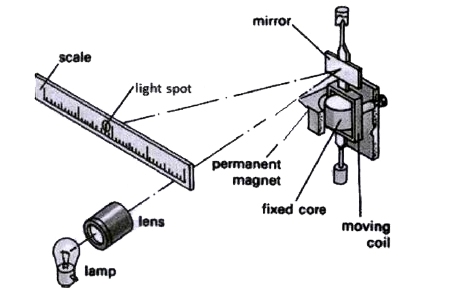 View Solution
View SolutionII. Read the following text and answer the following questions on the basis of the same:
Galvanometer can sense/measure current. Improved mirror galvanometer was developed by William Thomson, later to become Lord Kelvin, in 1858. Thomson intended the instrument to read weak signal currents on very long submarine telegraph cables.
The fundamental problems of transmitting/receiving a singnal through a lengthy submarine cable was that the electrical current tended to be very low (as littles as 1/100,000th of a stadard light bulb). So, it was very difficult to detect it. To solve the problem it was thought that larger amount of electric current would be sent through the line. But Thomson had a different approach. He thought the best response was to devise a device that could read faint signals. The galvanometer, first invented in 1802, was a mean of detecting electric current. It consisted of a needle that was deflected by the magnetic field created by the electric current. But the galvanometers of the day could't detect the weak signals that came through a long underwater cable. But the improved version of galvanometer was highly sensitive to detect the lowest current. The mirror galvanometer consists of a long fine coil of silk-covered copper wire. In the heart of that coil, within a little air-chamber, a small round mirror is hung by a single fibre of floss silk, with four tiny magnets cemented to its back.
A beam of light is thrown from a lamp upon the mirror, and reflected by it upon a white screen or scale a few feet distant, where it forms a bright spot of light, when there is no current on the instrument, the spot of light remains stationary at the zero position on the screen, but the instant a current traverses the long wire of the coil, the suspended magnets twist themselves horizontally out of their former position, the mirror is inclined with them, and the beam of light is deflected along the screen to one side or the other, according to the nature of the current. If positive electric current gives a deflection to the right of zero, a negative current will give a deflection to the left of zero, and vice versa.
The air in the little chamber surrounding the mirror is compressed, so as to act like a cushion, and deaden the movements of the mirror, the mirror is thus prevented from idly swinging about at each deflections.
The basic principle of gavanometer is
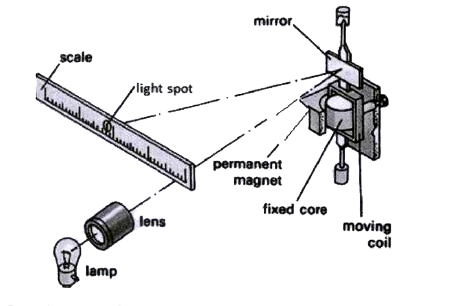 View Solution
View Solution

